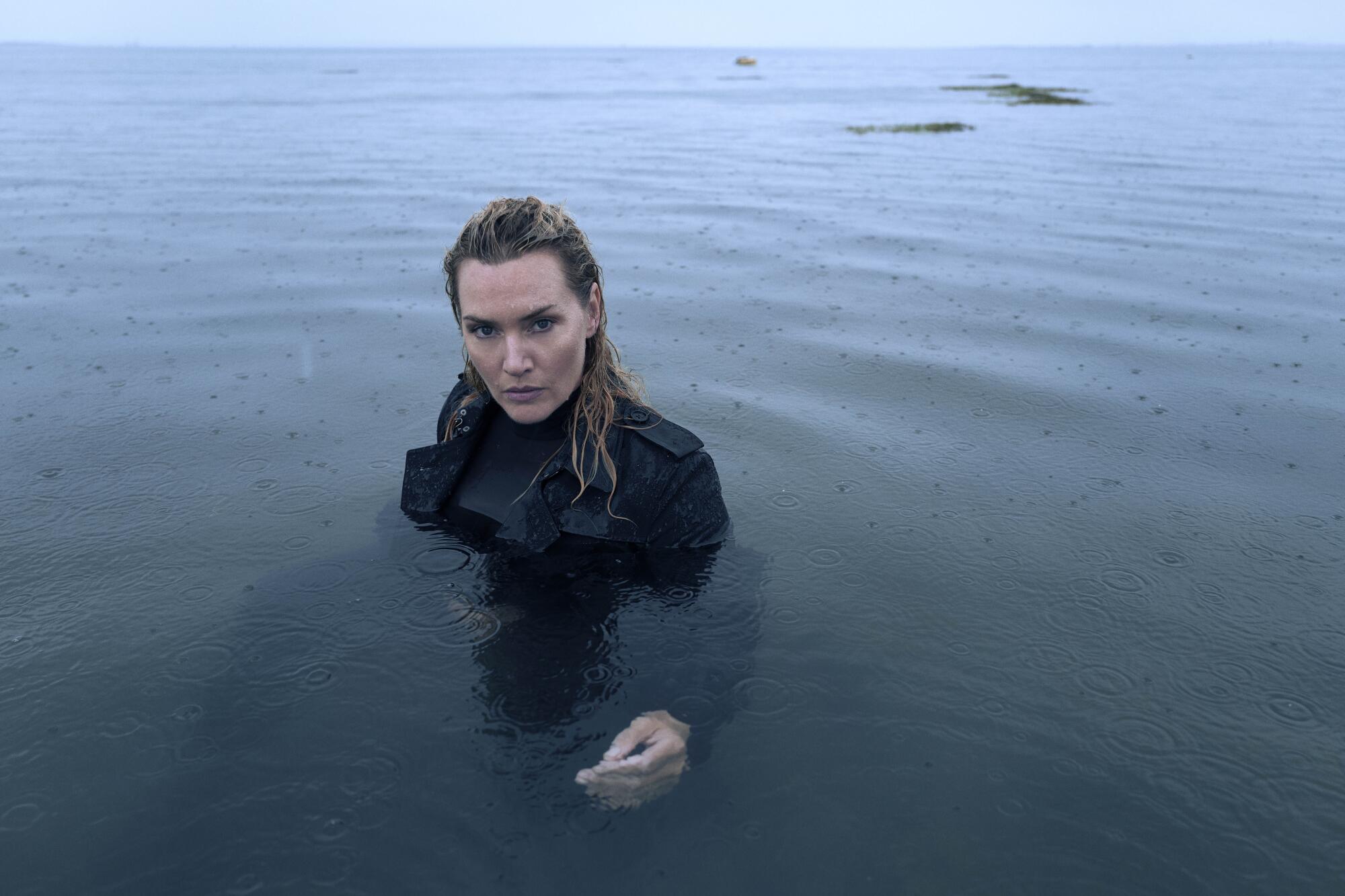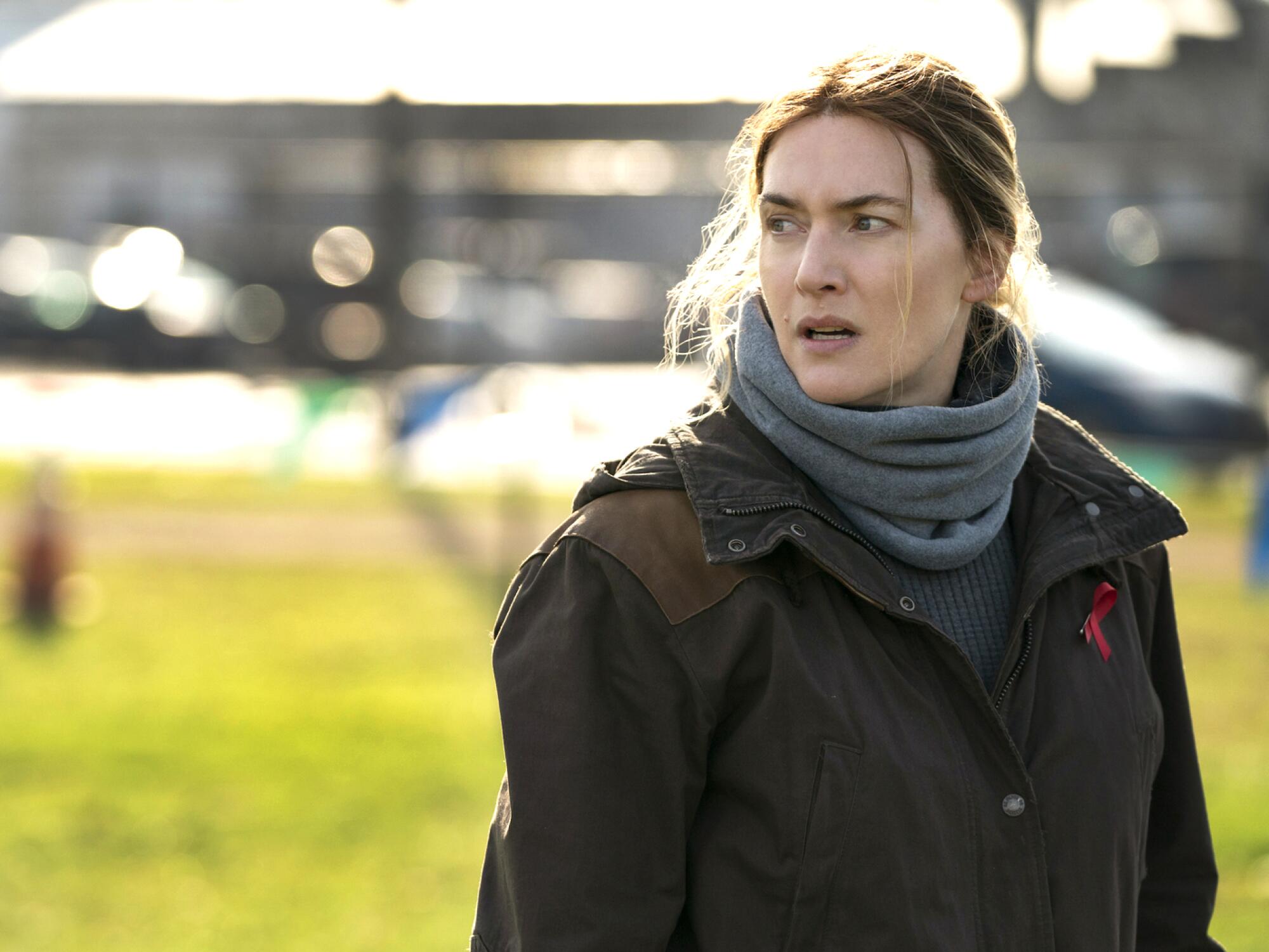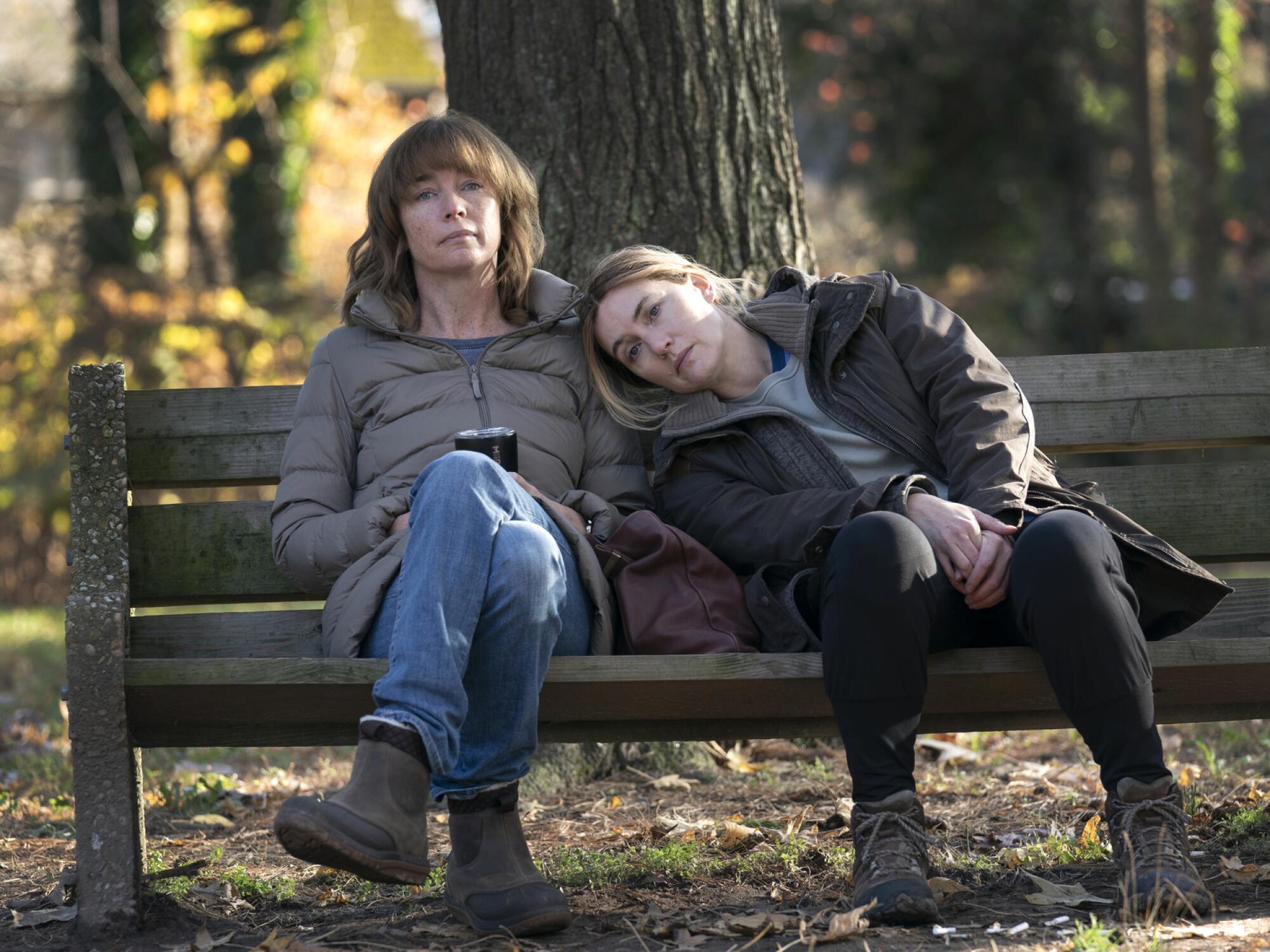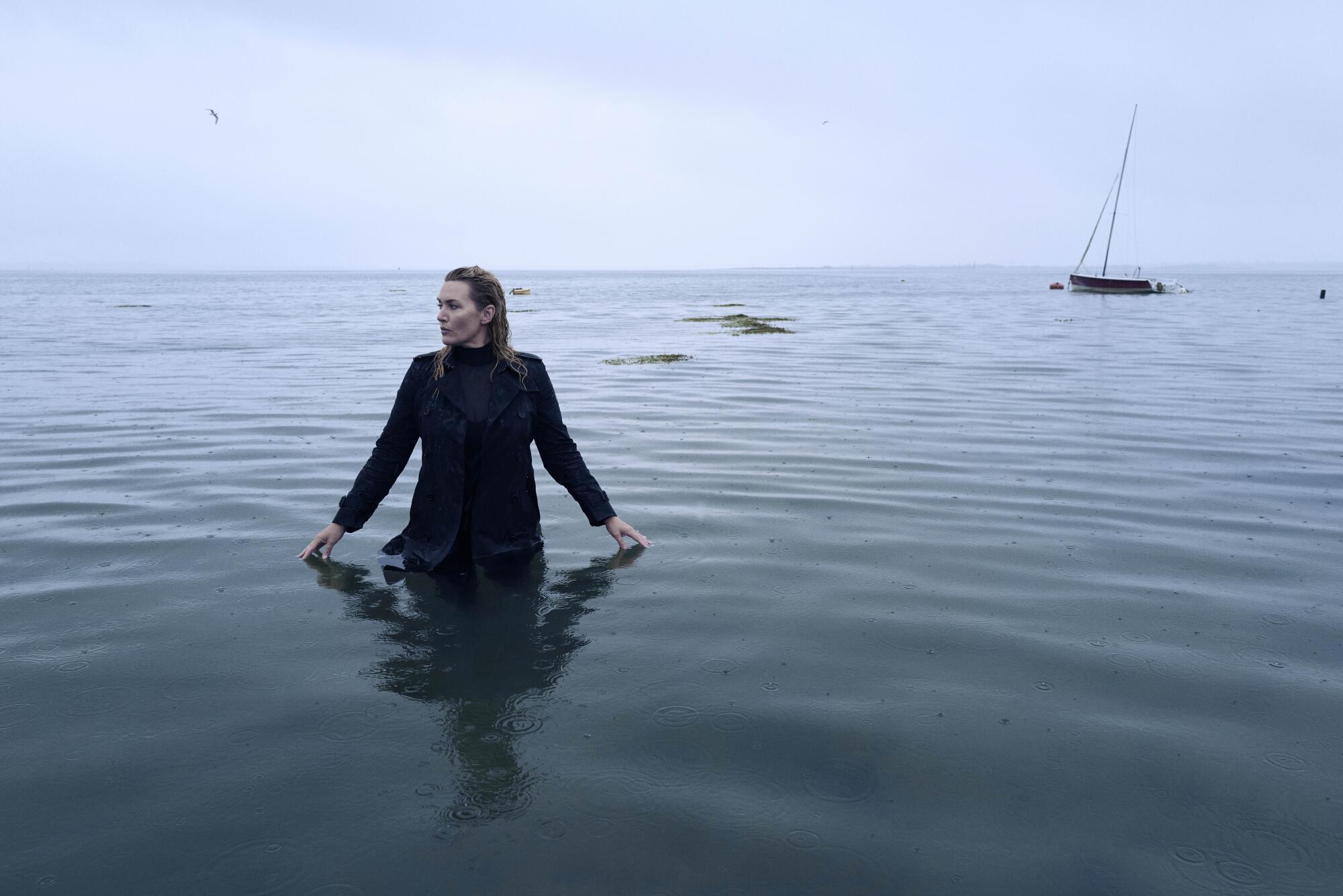
“Actors talking about their process can be so f— tedious. You go, ‘Shut up. You’re just a f— actor.”
Coming from Kate Winslet, this is both a preface and a warning, a self-aware salvo telling you that she’s about to dig into how Mare Sheehan — the gruff, opinionated, vape-smoking, hoagie-eating detective she played so memorably in the HBO limited series “Mare of Easttown” — got under her skin in ways that made it hard to let go. Not just hard. Almost impossible.
When the show wrapped production last year, Winslet had no idea how she could go about being herself again. It genuinely freaked her out. And because she didn’t want to break the spell of what Mare had meant to her, Winslet didn’t want to see anyone who didn’t know Mare, which, as you can well imagine, ruled out a lot of people.
“It was f— weird, to be honest. I don’t know how else to explain it,” Winslet says by email, when I asked her about it a few weeks after we had initially talked. “I just kept crying a lot. I had to get it out of my system. I drank some decent coffee (and vodka) and spent time with my 82-year-old dad where we’d do the crossword together. I went on a million long walks alone. With the dog. The dog didn’t expect anything of me. The dog didn’t care that I was randomly crying. ... That was a good thing.”

Eventually, Winslet broadened her circle, cooking vegetarian meals for her family, returning to domesticity and embracing the mundane. Mentioning Mare was discouraged, and gradually the character receded. “I had to let her quieten down by not giving her any air time in my own world,” Winslet says.
But that was last year. Now, all anyone wants to do is talk to Winslet about Mare. And not just journalists. As the series was airing this spring, strangers would approach Winslet on the street and stroke her arm and tell her it’s going to be OK, even if Mare did plant those drugs on that poor girl — what was she thinking? — and asking for some kind of reassurance that Mare would redeem herself.
Whether you’re a newcomer or a committed fan, our week-by-week guide to HBO’s crime drama will help you understand all things “Mare.”
Winslet reveled in this attention. She’s never experienced anything like it, not even with “Titanic,” which she couldn’t process at the time because she was 21 and suddenly famous and couldn’t fathom what was happening. With “Mare,” it wasn’t about Winslet ... mostly. It was about Mare, and Mare and her sarcastic mother, and Mare stuffing that duck liver pâté underneath the sofa cushion (“I’ve done it, more than once,” Winslet says, “but the plant pot is my go-to”), and grieving parents and every single person in Easttown, all adding up to what Winslet calls a “once-in-a-lifetime moment” (“and I’ve had some incredible moments,” she says, “incredible ones!”) that has her more than happy to talk about the character. At length. Even if it means discussing her bleeping process too.
These conversations aren’t limited to Zoom calls that begin in the early evening and wind their way through the night, with Winslet rising up at one point, pulling her hair into a ponytail and turning on a lamp because the house has gone dark. There are also discussions holding tantalizing ramifications. She and “Mare” creator Brad Ingelsby have talked and texted regularly about what a second chapter for Mare might look like, throwing ideas around and trying to crack a satisfying story.

When I ask Ingelsby about this, he begins by saying that there’s “a lot more questions than answers” and then embarks on a 10-minute conversational journey that moves from wondering how they could possibly match the emotion of Season 1 (Mare’s trauma over the loss of her son to suicide) to admitting that he’d “love nothing more than to do it.”
So, yeah, you can pretty much count on a Season 2.
Winslet, 45, says she’s having fun imagining what another go-around might look like — she politely giggles when I suggest sending Mare and her mother, the ice cream-hiding Helen, played by Jean Smart, on a road trip to visit Siobhan at Berkeley — though part of her thinks the whole notion of a follow-up is foolish. “Quit while you’re ahead,” she says. “That’s always been my hunch in life. Just walk away and leave it alone.”

That kind of pragmatism informs how she views her career. Winslet began acting as a teenager — “never a showoff,” she says — and was routinely astonished that people were paying her to pursue a passion that she had watched her grandparents and father do out of love. “At 17, I got on a f— plane and flew to New Zealand and shot ‘Heavenly Creatures’ for f— sake,” Winslet says, still amazed at this break nearly three decades after it happened. Ang Lee’s “Sense and Sensibility” came next; “Titanic” followed two years later.
But after winning an Emmy for the HBO limited series “Mildred Pierce” and starring in Steven Soderbergh’s prophetic pandemic thriller “Contagion” a decade ago, most of Winslet’s projects haven’t really landed with audiences. She says she has no problem with that.
“I have been more surprised by the success of a project than I have been disappointed by one,” she says in another email. “Because I have learned never to expect too much. It’s how I was raised, I think. I’m a realist. And being a part of something that might just come and go quite quickly at the box office never negates the experience for me. It’s good to just knuckle under and do the job regardless of how well it’s likely to perform.”
“I love the job of acting,” she continues. “So it’s always been a somewhat abstract and separate experience for me, when these things are actually released into the world. I get nervous and try and detach myself. Which is a self-protection thing, I suppose.”
But with “Mare,” Winslet couldn’t detach herself, not with her 20-year-old daughter, Mia, running up to her, holding out her phone, saying, “Mom, you have got to read some of these tweets. ... They’re hilarious” and her husband, Ned, telling her, ‘Babe, it’s safe. Just read this one [review] and this one because you deserve to enjoy the cool things that people are responding to.’” And she did, because even though Winslet didn’t expect “Mare” to be a hit, she was really hoping, quietly — not telling anyone — that people would find it and enjoy it.
“The joy that she took making the show and now the response to it is so delightful,” says friend Julianne Nicholson, who plays Mare’s best friend, Lori, in the series. The two women have a long history — Nicholson’s husband is godfather to Winslet’s 17-year-old son, Joe, and Winslet held Nicholson’s son shortly after he was born — and so Nicholson is something of a Winslet expert, delighting in both her humility (“her gratitude is lovely”) and her way with profanity (“it’s admirable how well swears sound in her mouth”).
That latter gift partially explains why Winslet heard from so many friends as “Mare” was airing, with everyone telling her “Kate! It’s you! It’s the real you!” Or: “You haven’t been as you as this since that episode of ‘Extras,’” referencing Winslet’s guest turn on Ricky Gervais’ HBO comedy series playing a potty-mouthed version of herself offering tips on phone sex and musing about what kinds of acting roles win Oscars. (The “Extras” Winslet takes a role as a nun in a Holocaust historical drama; three years later she’d win her Oscar playing a woman who was a Nazi concentration camp guard in “The Reader.”)
Ingelsby can see the similarities between the actress and his creation, mostly in Winslet sharing Mare’s down-to-earth nature and connection to family. Winslet believes the general public still perceives her simply as the socialite Rose (“I would say that the vast majority of people may have only seen me in ‘Titanic,’”) and picture her “sipping dainty little glasses of wine” instead of pounding Rolling Rocks. (For the record, Winslet prefers another Pennsylvania lager, Yuengling, though she’s not particular. “I mean, I love a bottle of beer,” she says.)
“Perhaps watching ‘Mare,’ for a lot of people, they’re like, ‘Holy s—! That’s her?’” Winslet says laughing. “I haven’t done a lot of mainstream pieces. So after ‘Titanic,’ it stands to reason people may have thought, ‘Oh. I wonder whatever happened to her?’”
Then they see Winslet’s unglamorous image on the promo poster for “Mare” and think, to use one of Winslet’s favorite expressions, “bloody hell.”
“I was a little ... um ... a touch taken aback by just how much people did respond to this downtrodden look of Mare,” Winslet says. “All I could think was, ‘Well, hell, I guess I’ve aged.’”
She’s not complaining, mind you. She speaks passionately and at length about the pleasures of working with “Mare’s” young actors, wishing she had found more mentors when she was starting her career. And with age, Winslet feels like she knows what’s she doing now and can fold into her performance all that expertise — honing the accent and the character’s physicality (“Mare’s heart broke the day her son died, and as a result her posture is slightly inward, as though she is hiding her cracked heart from the people closest to her,” she notes).
And still, she says, she feels as though she has never prepared thoroughly enough and that on the first day of filming, everyone’s going to look at her and think, “Why the f— did they cast her, and her accent is for s—.”
“It’s the first day at school every time, every time,” Winslet says, laughing. “I get in such a panic. My husband and kids will be like” — and here Winslet affects a soothing tone — “‘It’s OK. You’re getting your knickers in a twist. Have a cup of tea.’” She pauses. “I suppose all that’s part of what keeps the job interesting, don’t you think?”
More to Read
From the Oscars to the Emmys.
Get the Envelope newsletter for exclusive awards season coverage, behind-the-scenes stories from the Envelope podcast and columnist Glenn Whipp’s must-read analysis.
You may occasionally receive promotional content from the Los Angeles Times.










